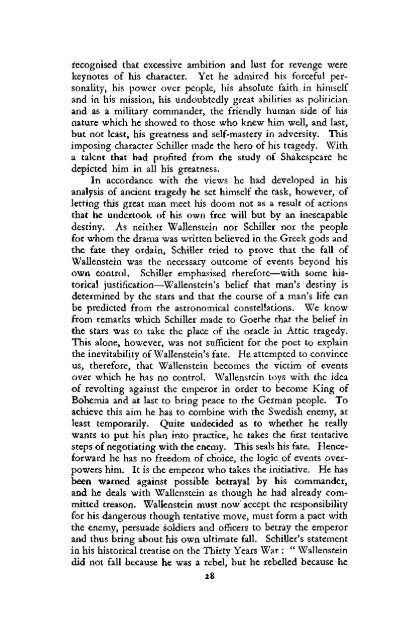Theoria - DISA
Theoria - DISA
Theoria - DISA
You also want an ePaper? Increase the reach of your titles
YUMPU automatically turns print PDFs into web optimized ePapers that Google loves.
ecognised that excessive ambition and lust for revenge were<br />
keynotes of his character. Yet he admired his forceful personality,<br />
his power over people, his absolute faith in himself<br />
and in his mission, his undoubtedly great abilities as politician<br />
and as a military commander, the friendly human side of his<br />
nature which he showed to those who knew him well, and last,<br />
but not least, his greatness and self-mastery in adversity. This<br />
imposing character Schiller made the hero of his tragedy. With<br />
a talent that had profited from the study of Shakespeare he<br />
depicted him in all his greatness.<br />
In accordance with the views he had developed in his<br />
analysis of ancient tragedy he set himself the task, however, of<br />
letting this great man meet his doom not as a result of actions<br />
that he undertook of his own free will but by an inescapable<br />
destiny. As neither Wallenstein nor Schiller nor the people<br />
for whom the drama was written believed in the Greek gods and<br />
the fate they ordain, Schiller tried to prove that the fall of<br />
Wallenstein was the necessary outcome of events beyond his<br />
own control. Schiller emphasised therefore—with some historical<br />
justification—Wallenstein's belief that man's destiny is<br />
determined by the stars and that the course of a man's life can<br />
be predicted from the astronomical constellations. We know<br />
from remarks which Schiller made to Goethe that the belief in<br />
the stars was to take the place of the oracle in Attic tragedy.<br />
This alone, however, was not sufficient for the poet to explain<br />
the inevitability of Wallenstein's fate. He attempted to convince<br />
us, therefore, that Wallenstein becomes the victim of events<br />
over which he has no control. Wallenstein toys with the idea<br />
of revolting against the emperor in order to become King of<br />
Bohemia and at last to bring peace to the German people. To<br />
achieve this aim he has to combine with the Swedish enemy, at<br />
least temporarily. Quite undecided as to whether he really<br />
wants to put his plan into practice, he takes the first tentative<br />
steps of negotiating with the enemy. This seals his fate. Henceforward<br />
he has no freedom of choice, the logic of events overpowers<br />
him. It is the emperor who takes the initiative. He has<br />
been warned against possible betrayal by his commander,<br />
and he deals with Wallenstein as though he had already committed<br />
treason. Wallenstein must now' accept the responsibility<br />
for his dangerous though tentative move, must form a pact with<br />
the enemy, persuade soldiers and officers to betray the emperor<br />
and thus bring about his own ultimate fall. Schiller's statement<br />
in his historical treatise on the Thirty Years War : " Wallenstein<br />
did not fall because he was a rebel, but he rebelled because he<br />
28
















